Abstract
To study the cellular infiltrate that occurs within the airways of infants with respiratory syncytial virus bronchiolitis, samples of airways secretions were obtained by bronchial lavage from the lower respiratory tract of infants ventilated for this condition and from the upper airway of non-intubated infants with this disorder using nasopharyngeal aspirates. Cytospin samples were prepared so that differential cell counts could be performed on the cells obtained and alkaline phosphatase-antialkaline phosphatase immunocytochemical analysis of lymphocyte subsets was carried out using a panel of monoclonal antibodies, which included anti-CD3, anti-CD4, anti-CD8, anti-CD19, and anti-TcR gamma delta. Results from the lower and upper airways were similar. Large numbers of inflammatory cells were obtained, of which neutrophils accounted for a median of 93% in the upper airway and 76% in the lower airway. The numbers of CD8 positive cells detected were small and consistently less than CD4 positive cells, median CD4:CD8 ratios being 22.5:1 and 15:1 for the lower and upper airways. CD19 positive cells were rarely observed and no gamma delta positive lymphocytes were detected. These results indicate that neutrophils probably play a major part in causing symptoms in these infants. They do not support the concept that excessive lymphocyte mediated cytotoxic activity is principally responsible for the pathology in respiratory syncytial virus bronchiolitis.
Full text
PDF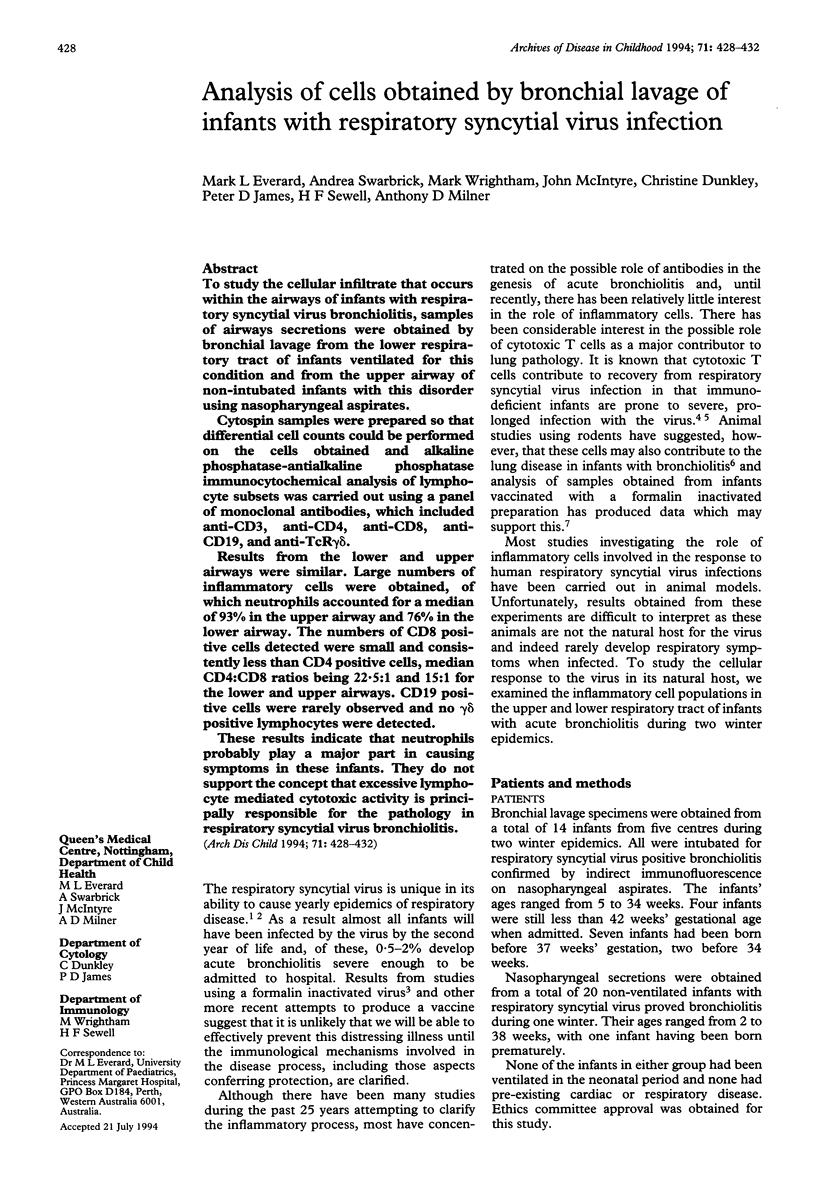
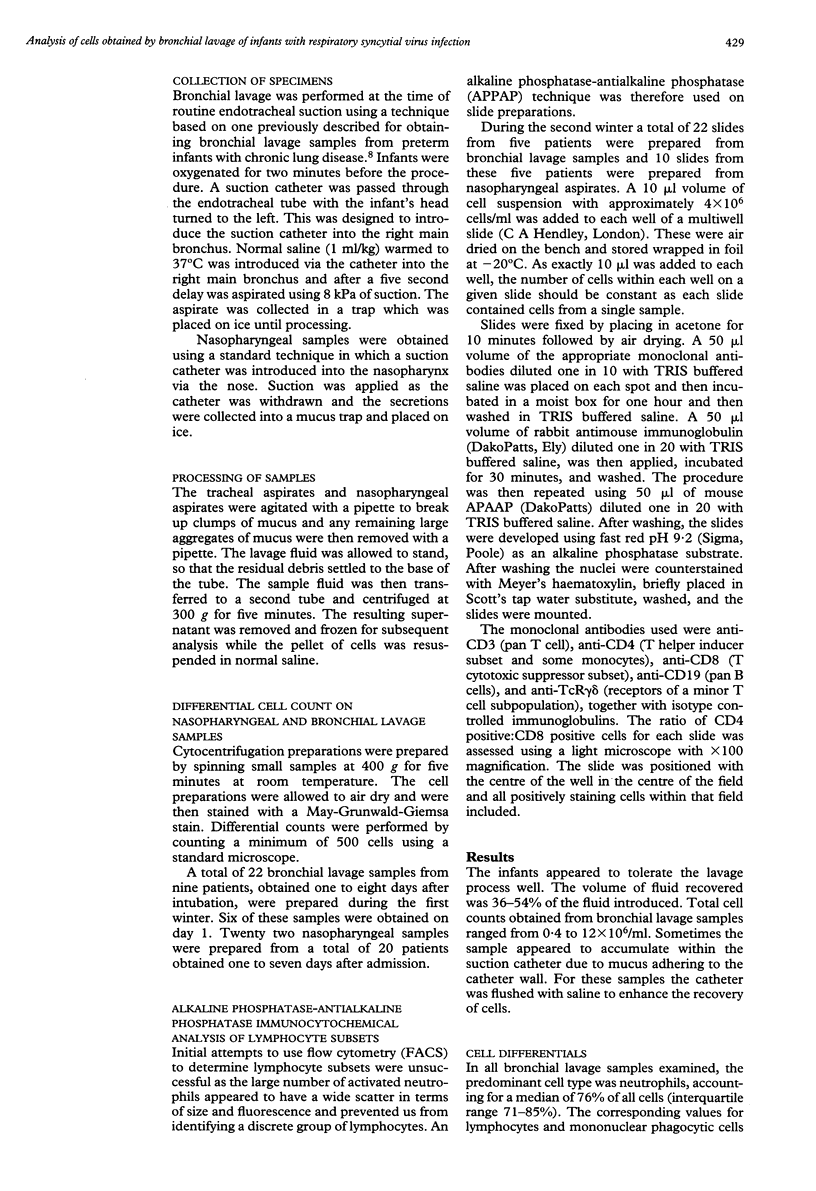
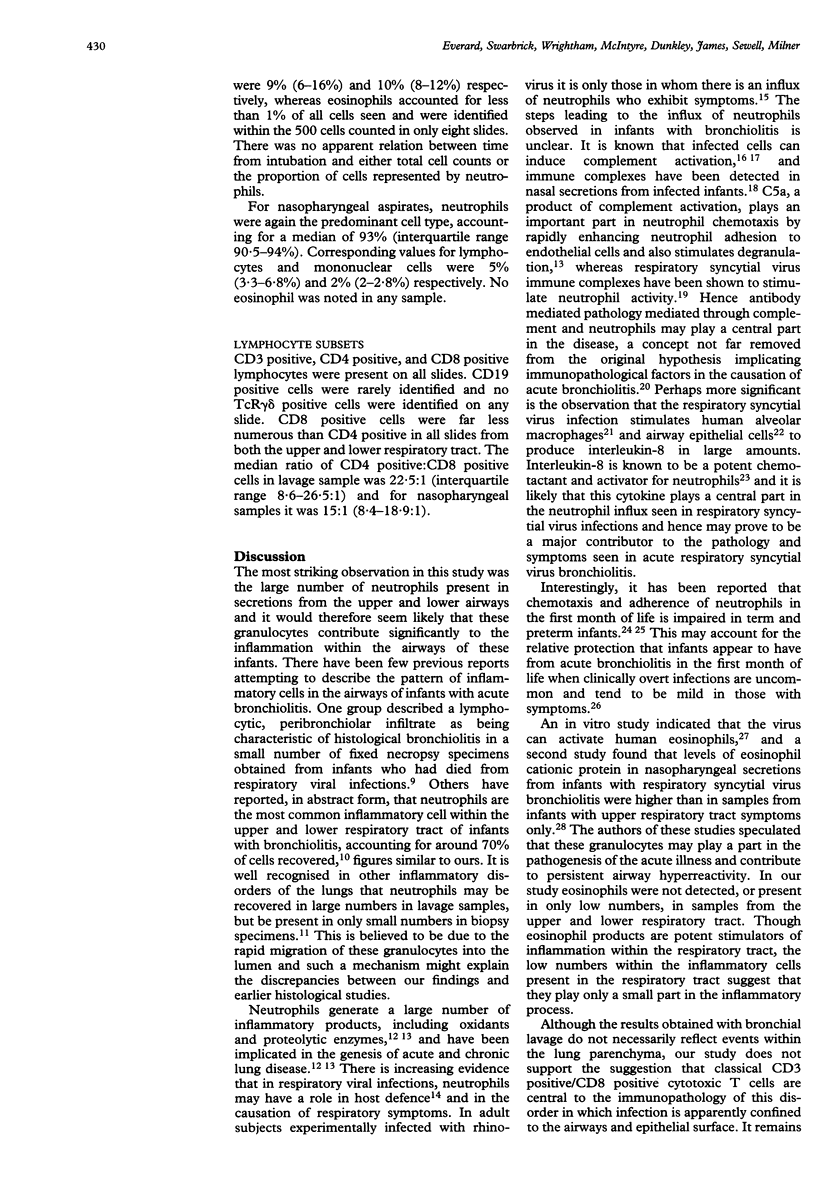
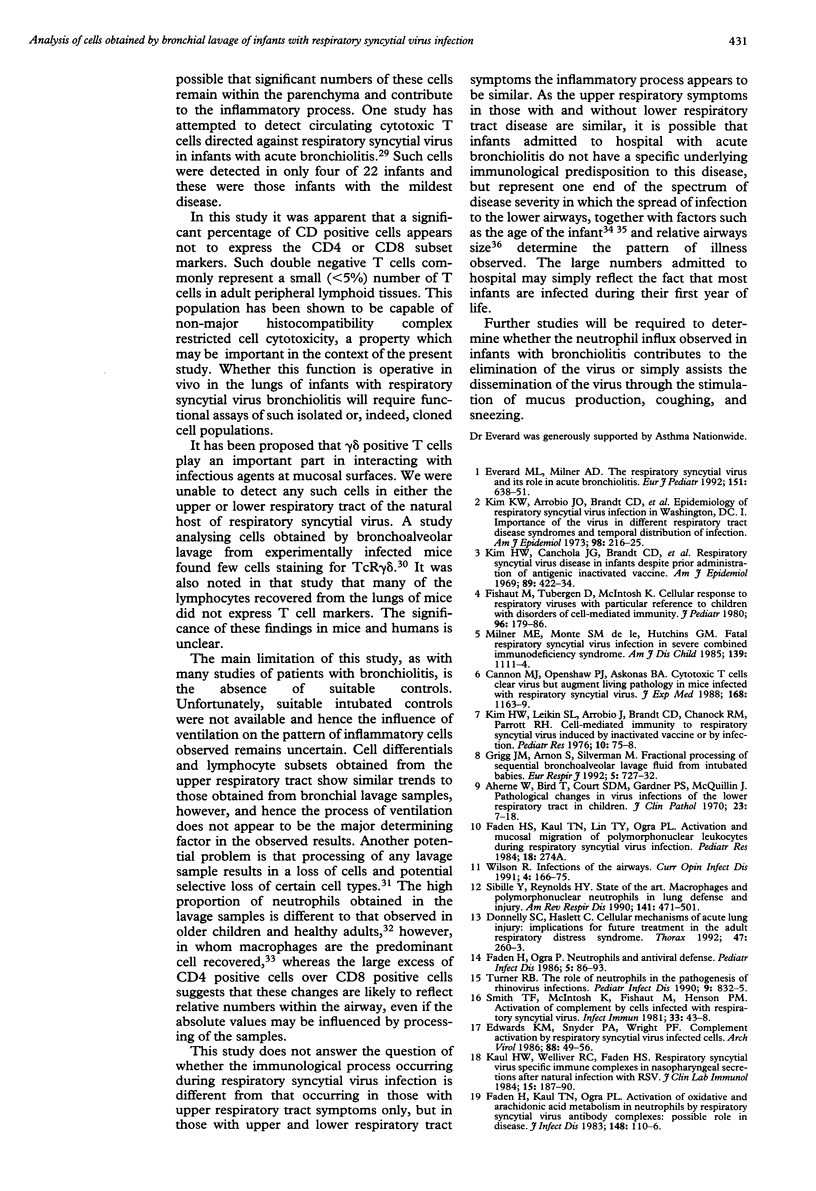
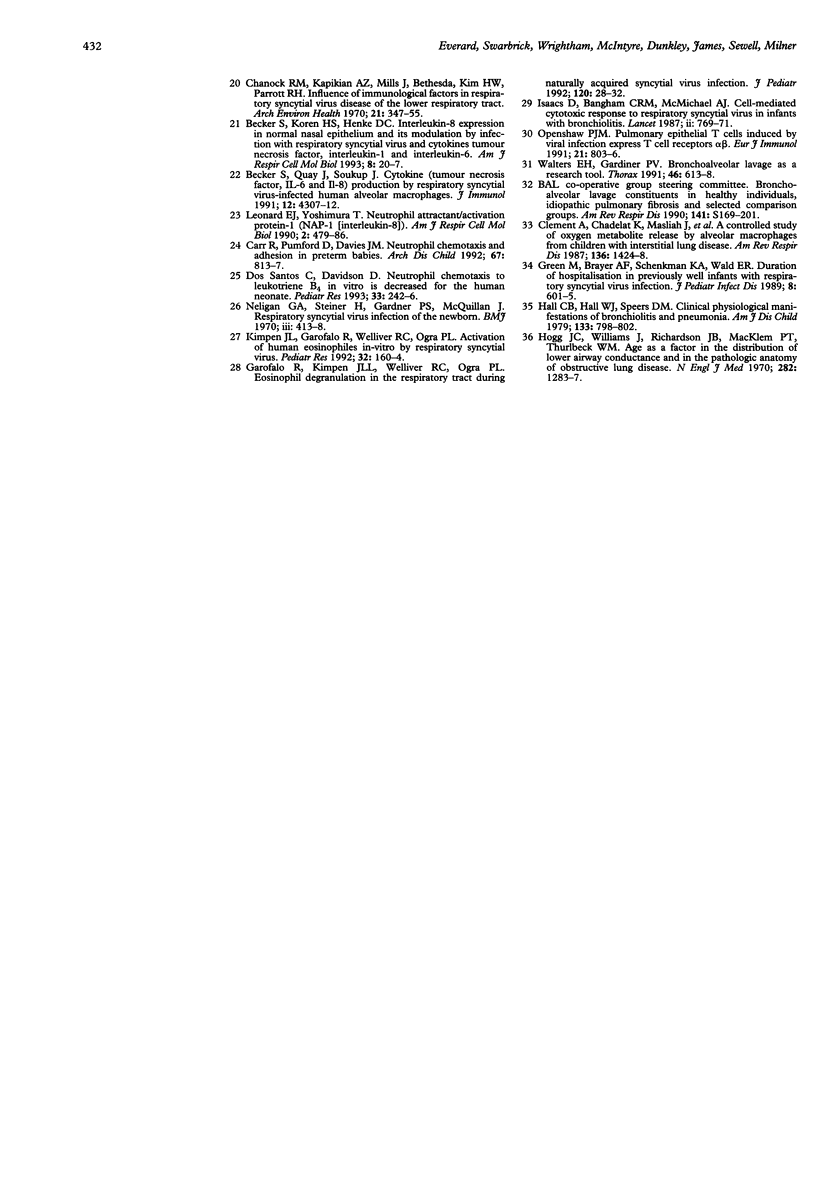
Selected References
These references are in PubMed. This may not be the complete list of references from this article.
- Aherne W., Bird T., Court S. D., Gardner P. S., McQuillin J. Pathological changes in virus infections of the lower respiratory tract in children. J Clin Pathol. 1970 Feb;23(1):7–18. doi: 10.1136/jcp.23.1.7. [DOI] [PMC free article] [PubMed] [Google Scholar]
- Becker S., Koren H. S., Henke D. C. Interleukin-8 expression in normal nasal epithelium and its modulation by infection with respiratory syncytial virus and cytokines tumor necrosis factor, interleukin-1, and interleukin-6. Am J Respir Cell Mol Biol. 1993 Jan;8(1):20–27. doi: 10.1165/ajrcmb/8.1.20. [DOI] [PubMed] [Google Scholar]
- Becker S., Quay J., Soukup J. Cytokine (tumor necrosis factor, IL-6, and IL-8) production by respiratory syncytial virus-infected human alveolar macrophages. J Immunol. 1991 Dec 15;147(12):4307–4312. [PubMed] [Google Scholar]
- Cannon M. J., Openshaw P. J., Askonas B. A. Cytotoxic T cells clear virus but augment lung pathology in mice infected with respiratory syncytial virus. J Exp Med. 1988 Sep 1;168(3):1163–1168. doi: 10.1084/jem.168.3.1163. [DOI] [PMC free article] [PubMed] [Google Scholar]
- Carr R., Pumford D., Davies J. M. Neutrophil chemotaxis and adhesion in preterm babies. Arch Dis Child. 1992 Jul;67(7 Spec No):813–817. doi: 10.1136/adc.67.7_spec_no.813. [DOI] [PMC free article] [PubMed] [Google Scholar]
- Chanock R. M., Kapikian A. Z., Mills J., Kim H. W., Parrott R. H. Influence of immunological factors in respiratory syncytial virus disease. Arch Environ Health. 1970 Sep;21(3):347–355. doi: 10.1080/00039896.1970.10667249. [DOI] [PubMed] [Google Scholar]
- Clement A., Chadelat K., Masliah J., Housset B., Sardet A., Grimfeld A., Tournier G. A controlled study of oxygen metabolite release by alveolar macrophages from children with interstitial lung disease. Am Rev Respir Dis. 1987 Dec;136(6):1424–1428. doi: 10.1164/ajrccm/136.6.1424. [DOI] [PubMed] [Google Scholar]
- Donnelly S. C., Haslett C. Cellular mechanisms of acute lung injury: implications for future treatment in the adult respiratory distress syndrome. Thorax. 1992 Apr;47(4):260–263. doi: 10.1136/thx.47.4.260. [DOI] [PMC free article] [PubMed] [Google Scholar]
- Dos Santos C., Davidson D. Neutrophil chemotaxis to leukotriene B4 in vitro is decreased for the human neonate. Pediatr Res. 1993 Mar;33(3):242–246. doi: 10.1203/00006450-199303000-00006. [DOI] [PubMed] [Google Scholar]
- Edwards K. M., Snyder P. N., Wright P. F. Complement activation by respiratory syncytial virus-infected cells. Arch Virol. 1986;88(1-2):49–56. doi: 10.1007/BF01310889. [DOI] [PubMed] [Google Scholar]
- Everard M. L., Milner A. D. The respiratory syncitial virus and its role in acute bronchiolitis. Eur J Pediatr. 1992 Sep;151(9):638–651. doi: 10.1007/BF01957564. [DOI] [PubMed] [Google Scholar]
- Faden H., Kaul T. N., Ogra P. L. Activation of oxidative and arachidonic acid metabolism in neutrophils by respiratory syncytial virus antibody complexes: possible role in disease. J Infect Dis. 1983 Jul;148(1):110–116. doi: 10.1093/infdis/148.1.110. [DOI] [PubMed] [Google Scholar]
- Faden H., Ogra P. Neutrophils and antiviral defense. Pediatr Infect Dis. 1986 Jan-Feb;5(1):86–92. doi: 10.1097/00006454-198601000-00015. [DOI] [PubMed] [Google Scholar]
- Fishaut M., Tubergen D., McIntosh K. Cellular response to respiratory viruses with particular reference to children with disorders of cell-mediated immunity. J Pediatr. 1980 Feb;96(2):179–186. doi: 10.1016/s0022-3476(80)80799-2. [DOI] [PubMed] [Google Scholar]
- Garofalo R., Kimpen J. L., Welliver R. C., Ogra P. L. Eosinophil degranulation in the respiratory tract during naturally acquired respiratory syncytial virus infection. J Pediatr. 1992 Jan;120(1):28–32. doi: 10.1016/s0022-3476(05)80592-x. [DOI] [PubMed] [Google Scholar]
- Green M., Brayer A. F., Schenkman K. A., Wald E. R. Duration of hospitalization in previously well infants with respiratory syncytial virus infection. Pediatr Infect Dis J. 1989 Sep;8(9):601–605. doi: 10.1097/00006454-198909000-00007. [DOI] [PubMed] [Google Scholar]
- Grigg J., Arnon S., Silverman M. Fractional processing of sequential bronchoalveolar lavage fluid from intubated babies. Eur Respir J. 1992 Jun;5(6):727–732. [PubMed] [Google Scholar]
- Hall C. B., Hall W. J., Speers D. M. Clinical and physiological manifestations of bronchiolitis and pneumonia. Outcome of respiratory syncytial virus. Am J Dis Child. 1979 Aug;133(8):798–802. doi: 10.1001/archpedi.1979.02130080038006. [DOI] [PubMed] [Google Scholar]
- Hogg J. C., Williams J., Richardson J. B., Macklem P. T., Thurlbeck W. M. Age as a factor in the distribution of lower-airway conductance and in the pathologic anatomy of obstructive lung disease. N Engl J Med. 1970 Jun 4;282(23):1283–1287. doi: 10.1056/NEJM197006042822302. [DOI] [PubMed] [Google Scholar]
- Isaacs D., Bangham C. R., McMichael A. J. Cell-mediated cytotoxic response to respiratory syncytial virus in infants with bronchiolitis. Lancet. 1987 Oct 3;2(8562):769–771. doi: 10.1016/s0140-6736(87)92502-5. [DOI] [PubMed] [Google Scholar]
- Kaul T. N., Welliver R. C., Faden H. S., Ogra P. L. The development of respiratory syncytial virus-specific immune complexes in nasopharyngeal secretions following natural infection. J Clin Lab Immunol. 1984 Dec;15(4):187–190. [PubMed] [Google Scholar]
- Kim H. W., Arrobio J. O., Brandt C. D., Jeffries B. C., Pyles G., Reid J. L., Chanock R. M., Parrott R. H. Epidemiology of respiratory syncytial virus infection in Washington, D.C. I. Importance of the virus in different respiratory tract disease syndromes and temporal distribution of infection. Am J Epidemiol. 1973 Sep;98(3):216–225. doi: 10.1093/oxfordjournals.aje.a121550. [DOI] [PubMed] [Google Scholar]
- Kim H. W., Canchola J. G., Brandt C. D., Pyles G., Chanock R. M., Jensen K., Parrott R. H. Respiratory syncytial virus disease in infants despite prior administration of antigenic inactivated vaccine. Am J Epidemiol. 1969 Apr;89(4):422–434. doi: 10.1093/oxfordjournals.aje.a120955. [DOI] [PubMed] [Google Scholar]
- Kim H. W., Leikin S. L., Arrobio J., Brandt C. D., Chanock R. M., Parrott R. H. Cell-mediated immunity to respiratory syncytial virus induced by inactivated vaccine or by infection. Pediatr Res. 1976 Jan;10(1):75–78. doi: 10.1203/00006450-197601000-00015. [DOI] [PubMed] [Google Scholar]
- Kimpen J. L., Garofalo R., Welliver R. C., Ogra P. L. Activation of human eosinophils in vitro by respiratory syncytial virus. Pediatr Res. 1992 Aug;32(2):160–164. doi: 10.1203/00006450-199208000-00007. [DOI] [PubMed] [Google Scholar]
- Leonard E. J., Yoshimura T. Neutrophil attractant/activation protein-1 (NAP-1 [interleukin-8]). Am J Respir Cell Mol Biol. 1990 Jun;2(6):479–486. doi: 10.1165/ajrcmb/2.6.479. [DOI] [PubMed] [Google Scholar]
- Milner M. E., de la Monte S. M., Hutchins G. M. Fatal respiratory syncytial virus infection in severe combined immunodeficiency syndrome. Am J Dis Child. 1985 Nov;139(11):1111–1114. doi: 10.1001/archpedi.1985.02140130049028. [DOI] [PubMed] [Google Scholar]
- Openshaw P. J. Pulmonary epithelial T cells induced by viral infection express T cell receptors alpha/beta. Eur J Immunol. 1991 Mar;21(3):803–806. doi: 10.1002/eji.1830210338. [DOI] [PubMed] [Google Scholar]
- Sibille Y., Reynolds H. Y. Macrophages and polymorphonuclear neutrophils in lung defense and injury. Am Rev Respir Dis. 1990 Feb;141(2):471–501. doi: 10.1164/ajrccm/141.2.471. [DOI] [PubMed] [Google Scholar]
- Smith T. F., McIntosh K., Fishaut M., Henson P. M. Activation of complement by cells infected with respiratory syncytial virus. Infect Immun. 1981 Jul;33(1):43–48. doi: 10.1128/iai.33.1.43-48.1981. [DOI] [PMC free article] [PubMed] [Google Scholar]
- Turner R. B. The role of neutrophils in the pathogenesis of rhinovirus infections. Pediatr Infect Dis J. 1990 Nov;9(11):832–835. doi: 10.1097/00006454-199011000-00011. [DOI] [PubMed] [Google Scholar]
- Walters E. H., Gardiner P. V. Bronchoalveolar lavage as a research tool. Thorax. 1991 Sep;46(9):613–618. doi: 10.1136/thx.46.9.613. [DOI] [PMC free article] [PubMed] [Google Scholar]


